

August 14, 2023
Culture of Chaos ,Great cultures ,Productivity
The question in hybrid work is when should we bring people to the office instead of letting people stay at home?
The brilliant people at NOBL figured out a great model, based on what type of work actually needs to be accomplished (which is so refreshing compared to dialogue about how many days).
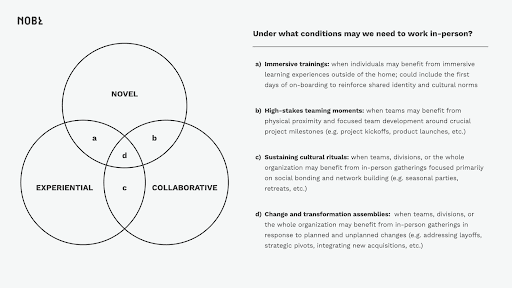
Novel:
The task or challenge is new; there may not be an established process. When it’s new, there can be a lot of fear and anxiety and it’s easiest to relieve emotional discordance in person. It’s also very hard to read tone over the text of email or Slack. This is where hybrid work switches to in person.
Experiential:
An immersive experience can possibly be more effective. This is especially helpful if you do anything tactile.
Collaborative:
When tasks require sustained synchronous participation among a group. So obvious and yet with hybrid work, everyone is still obsessed with staying at home. It’s truly hilarious that Zoom is having trouble getting people to come into the office. The problem is they haven’t created a great collaborative culture such that people actually want to come to the office. (There’s a lot of room for creativity here).
Hybrid work culture can include: team building, annual strategy meetings, and change initiatives. And remember, if it’s important, put it on the calendar!
Going into the office is supposed to be a great experience! Where are you falling short?
I’ll tell you one way is to upgrade the coffee. I need to do an article on this because the CEO of United Airlines recently said that what motivated him to start making serious changes was hearing the airplane stewards say they were tired of apologizing for the bad coffee.
As always, remember that culture is co-created. So don’t think you have to figure this out all on your own. You can crowdsource the ideas and then experiment.
March 31, 2022
Culture of Chaos ,Great cultures ,Hacks ,Productivity
In high performance companies, HR often has to remind people to take their time off because they spend so much time at work.
The problem is that these high performers see vacations as a luxury, as opposed to a productivity hack that helps the company.
Think about it this way – Do you usually get more or less done right before a vacation? A lot, right?
So if HR (or managers) proactively address this before burnout, it will make the individuals more productive.
So pull each person aside and say, “I’d like you to plan your vacation that you’ll take 3 months from now.” It will probably make them nervous, but explain to them that:
a) This will make them more productive so they will get things done before the vacation starts and
b) It helps the team because if anyone is so crucial they can’t even miss a week, then the team is not resilient. This forces the team to be resilient by making sure the operations are covered.
So go ahead, while it’s on your mind. Set up those meetings to ask people to proactively schedule their vacations.
October 31, 2019
Great cultures ,Productivity ,Tools
Everyone knows the path to success is not a straight line, but it’s NOT total chaos like some think either:
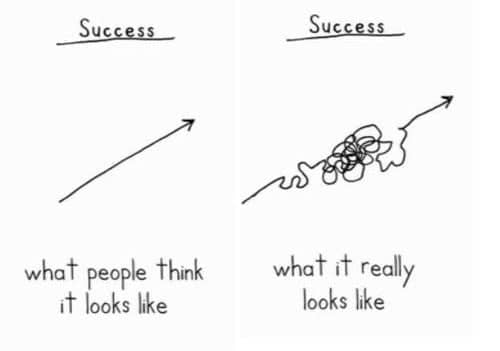
Image credit: This Is A Book, by Demetri Martin
I think the best path is described in the book Principles, by Ray Dahlio.
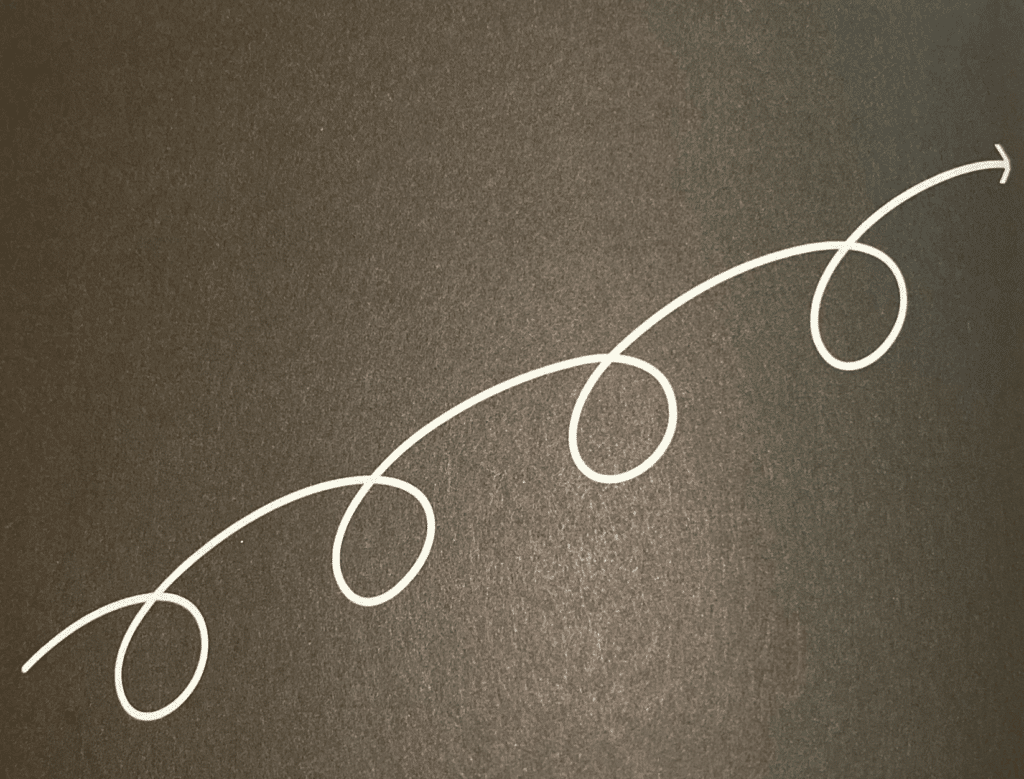
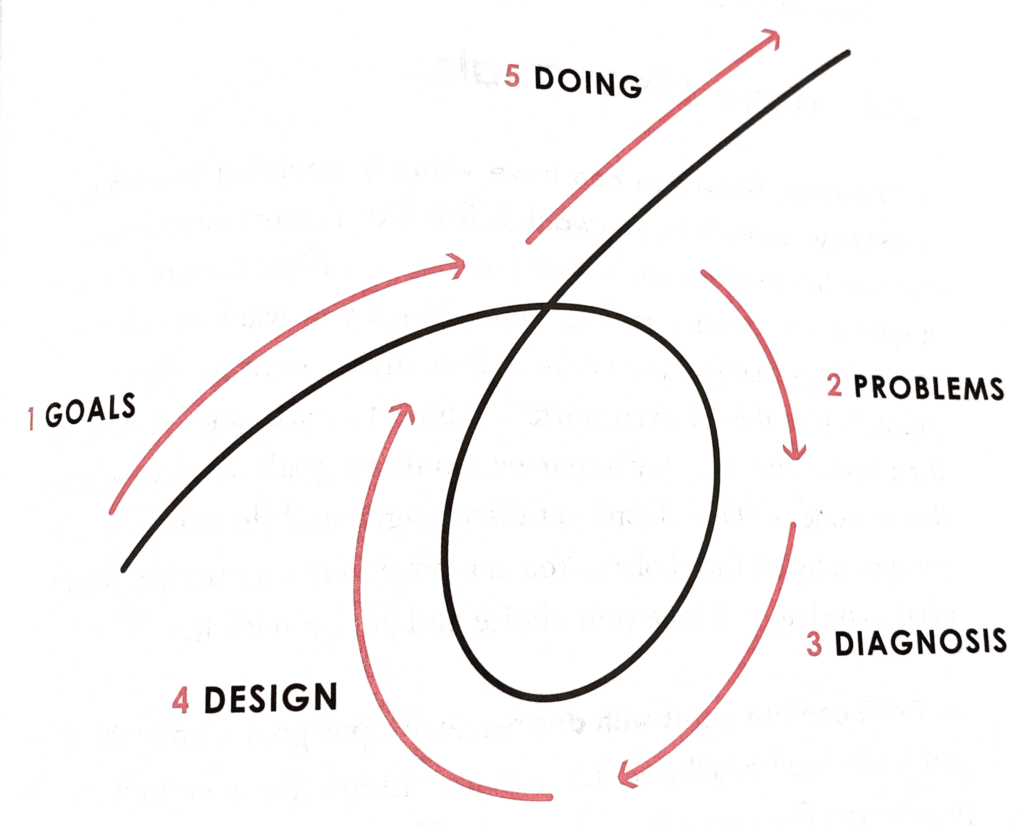
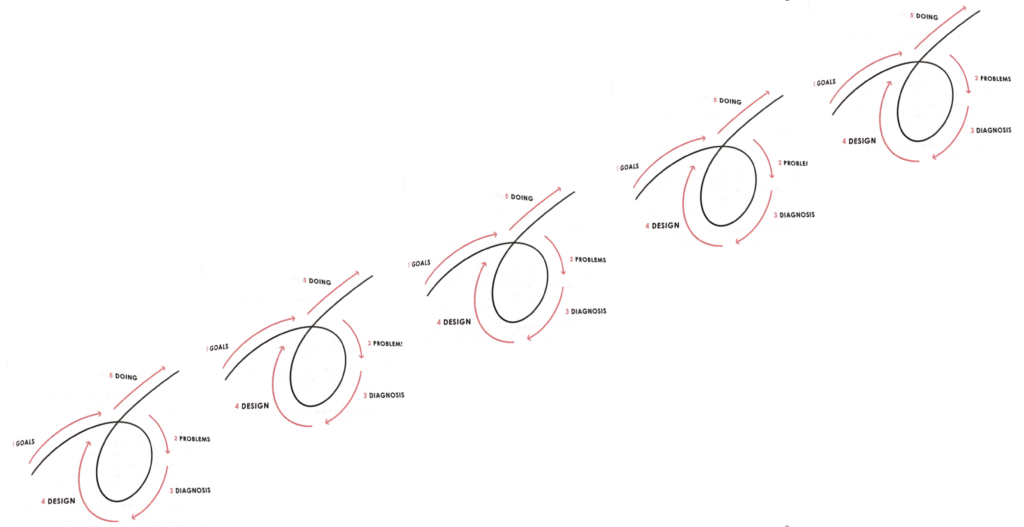
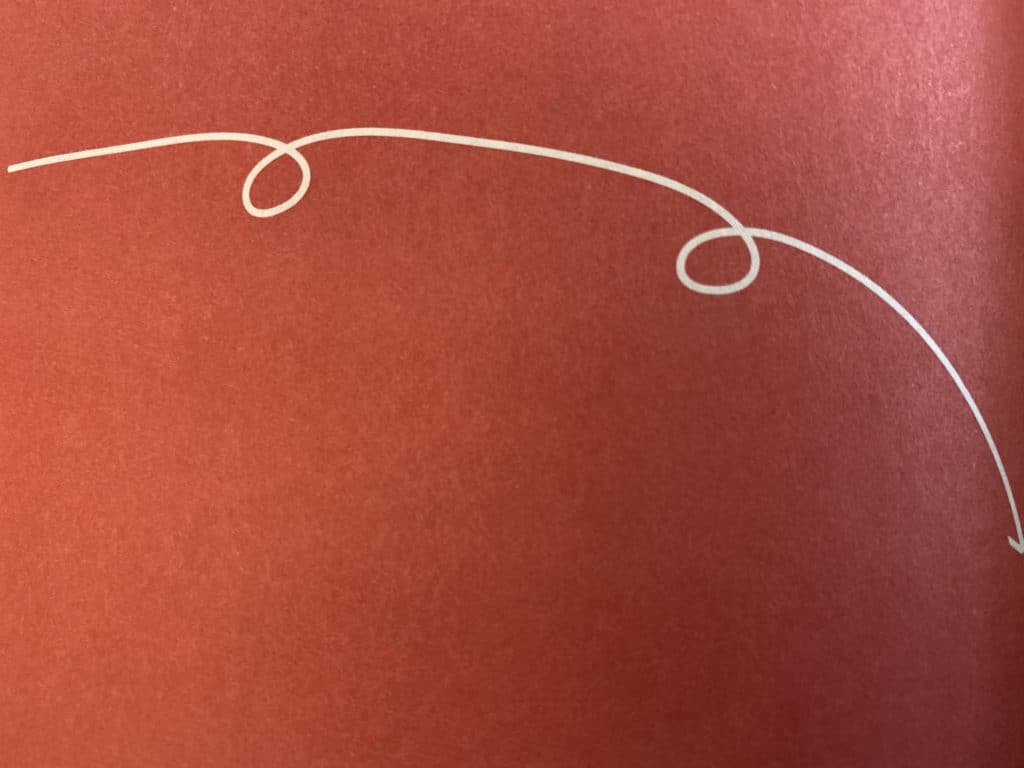
June 5, 2019
Productivity

You think it’s to Get Stuff Done, right? Wrong. That’s actually a by-product of a well-done system.
I’ve had to learn this the hard way, so hear me out…
First, basic systems theory states that the purpose of a system is not the design of a system. The purpose of a system is determined by its actual use and results.
The result of a to-do list is not actually getting things done because sometimes it happens and sometimes it doesn’t (am I right?)… BUT what is guaranteed from a well-structured system is a CLEAR VIEW OF THE TRUTH.
That means, a clear view of:
**What’s actually getting done.
**What’s getting stuck
**What you’re waiting on from other people
**What is getting neglected.
**What lingers for weeks and months
A great system shows you the truth in a fast snapshot. And then it’s your choice what you do with that truth.
Oddly, the result is peace, because it all becomes conscious. There’s no more “I forgot” no more “They never got back to me.” No more “What the heck did I even do this week?”
Do you have a system? “All change starts with the truth.” – Dan Sullivan
July 6, 2016
Culture of Chaos ,Hacks ,Productivity
When Lance Armstrong got to Europe for his first Tour de France, he quickly realized he had to either start doping or accept losing to those who did. It was a different game.
Could corporate America go the same direction? It’s possible.
Silicon Valley executives have long been known to take modafinil (brand name Provigil) to gain a cognitive edge, and it seems that Wall Street does as well. Still others create their own “custom stacks” of over the counter supplements.
These smart drugs seem to speed up the brain, and yet other workers use the effects of marijuana to focus and reduce stress.
And what about for insights and ideas? In this piece on CNN, Venture Capitalist Tim Ferriss shares that every billionaire he knows “takes psychedelics on a regular basis.”
And if we look at the offices of a smart drug supplement company, what do they do to get that extra edge? Fasting. Nootrobox‘s employees stop eating from Monday night to Wednesday morning every week. This article in Fortune explains the psychology of why fasting actually enhances our cognition.
Could performance-enhancement be the new reality of companies that outperform the others, the way doped riders took all the awards at the Tour de France?
October 14, 2015
Hacks ,Productivity
When I was 60K in debt from a failed business, depressed and low on hope I invested my time in something that made no financial sense…
I became a spinning instructor.
I had always wanted to be one since high school. I loved the combination of DJ, coach and speaker. So much time was spent on training and making mixes that I lost money. And yet, I had so much fun that I was able to use all of the energy to launch my next career. Again, it did not make sense from a practical perspective, but I followed the energy.
For me, it’s often a distinction between what looks good versus what feels good…
It’s a date who looks amazing, but I don’t feel myself around her. It’s a house I’m looking at that has all the amenities, but doesn’t feel like home. It’s a speech that delivers on paper, but I don’t care about it.
It takes courage to follow the energy, but more importantly it takes curiosity and a sense of wonder.
All of this applies to culture as well, since culture is simply a bunch of people together. If the group is following what “should” matter (results, revenue, profit, new manager program du jour), and not what they’re passionate about (the customer, the values, the product, or even each other), then the culture eventually goes south.
Veteran pilots still use checklists. Yoyo Ma still plays scales. And the best athletes practice for hours.
I’m always amazed by how much it’s the basics that make the difference.
On the personal level it’s really about getting great food, sleep, exercise and meditation. I heard that neurosis is the result of denying our animal nature, and I can tell you if I don’t get exercise I anxious and neurotic. In fact, if I do boxing or martial arts I’m so peaceful I don’t even have thoughts in my head afterward.
On the corporate level it’s about meetings. Most companies are terrible at meetings. They’ll take on multi-million dollar change initiatives and yet everyday meetings are dysfunctional.
When I work with teams I start with the basics: Can you be on time? If you show up late and run over then you’re prioritizing your own personal agendas over the culture. But if you’re on time, you’re honoring commitments. There’s no point working on values if you can’t even be on time.
Flow is “the mental state of operation in which a person performing an activity is fully immersed in a feeling of energized focus, full involvement, and enjoyment in the process of the activity. In essence, flow is characterized by complete absorption in what one does.” (1) It’s when athletes are “in the zone.”
I have a million things on my to do list, and trying to multi-task is a joke. It just adds stress. I continue to learn that lesson. But focus is heaven. It feels like a luxury.
Getting totally absorbed with a task (even if it’s one I don’t like) is a pure joy. A friend of mine who survived drug addiction started his life again by cleaning chandeliers. He said it was one of the most joyful times of his life because it was so simple.
Looking back on this list I see the lessons could also be re-written as temptations:
1. Follow the Energy
(Temptation: Choosing what “should” be done, or what looks good instead of what feels good)
2. Get back to the Basics
(Temptation: Going for the new shiny object)
3. Focus is Flow
(Temptation: Multi-tasking, letting texts, emails and facebook interrupt me)